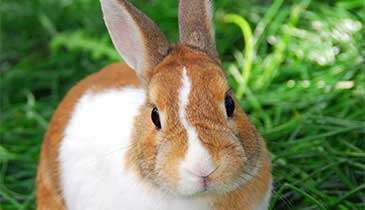How happy and healthy is your rabbit?

Rabbits are the UK's third most popular pet, after cats and dogs, with around 1.7 million kept as pets but very little is known about their quality of life. A new University of Bristol study has found although many pet rabbits are happy and healthy several issues, including living alone or with unsuitable animals, affect many rabbits.
The research led by academics at the University's School of Veterinary Sciences and funded by the RSPCA is published in BMC Research Notes.
The aim of the study was to find out how pet rabbits are currently housed and cared for and to compare their health and welfare. Questionnaires were completed by a cross-section of 1,254 pet rabbit owners in the South West (Bristol and North Somerset), the North West (Manchester and the Wirral) and the East of England (Norwich and Eastern Norfolk).
The researchers found some expected and also surprising results from the returned questionnaires. As expected, pet rabbits in England are kept in a variety of housing. Most rabbits had access to extra areas for exercise but access was often irregular or not at the times of the day when rabbits are naturally most active, which is the early morning or evening.
About 60 per cent of the 1,254 rabbits were housed without a companion, which limits their opportunity to show natural social behaviours. About a quarter of the rabbits with companions were found to sometimes fight and avoid each other. A small amount of this may be natural but more frequent and intense fighting can suggest the companions are unsuited and behavioural advice should be sought.
Hay is extremely important for rabbit health and in this study, the researchers were encouraged that 98 per cent of owners did feed hay to their rabbits, but for ten per cent this was less than daily, which may be cause for concern.
Dr Nicola Rooney, Research Fellow in Farm Animal Science at the University's School of Veterinary Sciences, said: "Many pet rabbits were found to be in good health, had compatible companions and were provided with enriched living areas. However, we also found numerous unrecognised welfare issues that affect large numbers of pet rabbits. These included living alone or in incompatible groups, numerous health issues, lack of regular access to exercise areas, showing fear of loud noises and behaving anxiously when handled by their owners.
"Our findings highlight the ways in which the needs of pet rabbits are often not being met and this information will be used to help target education to best improve the welfare of pet rabbits."
Dr Jane Tyson, Rabbit Behaviour and Welfare Expert at the RSPCA, added: "Whilst it is encouraging to see that many pet rabbits are living healthy and happy lives, it is also saddening to hear that a large number of rabbits are not having their welfare needs met.
"The RSPCA is working closely with other stakeholders to identify a number of different activities and initiatives to protect and improve the welfare of pet rabbits and the findings of this study will be crucial in assisting this work as well as identifying advice and information for owners on how best to care for their rabbits."
As in previous studies, dental problems were commonly reported in 12.2 per cent of rabbits, as were eye problems (12.9 per cent), digestive problems (11.5 per cent) and parasites (11.3 per cent).
A large proportion, 58 per cent, of rabbits were thought to be fearful of loud noises and 61 per cent were not reported as calm when handled by their owner, which may be a significant concern for this species.
The researchers suggest further studies are required to explore the accuracy of the owners' reports, in case problems have been under-reported, and prioritising the issues raised in this study, as well as deriving education resources to help improve some of the current shortfalls in knowledge.
More information: "The current state of welfare, housing and husbandry of the English pet rabbit population." BMC Res Notes. 2014 Dec 22;7(1):942. www.ncbi.nlm.nih.gov/pubmed/25532711
Provided by University of Bristol

















